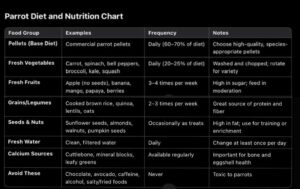how long does a parrot live
Parrots are well known for their vivid hues, sharp minds, and gregarious dispositions. Their potential longevity is among these bird partners’ most amazing features. Comprehending the lifespan of various parrot species is essential for both potential and existing owners, as it highlights the sustained dedication needed to provide for these birds.
🦜 Understanding Parrot Lifespans
Because of variables like size, genetics, environment, and care, parrot lifespans differ greatly between species. Larger parrots typically have longer lifespans than smaller ones. Larger parrots can live for several decades, and under ideal circumstances, some can live for a century, while some small species may only live for ten years.
📊 Lifespan by Parrot Species
Here’s an overview of the average lifespans of various parrot species:

Small Parrots
• Budgerigars (Budgies): Typically live between 5 to 10 years, though some may reach up to 15 years with excellent care .
• Lovebirds: Average lifespan ranges from 10 to 15 years .
• Cockatiels: Can live between 15 to 25 years .
Medium Parrots
• Conures: Lifespan varies by species, generally between 10 to 30 years .
• Quaker Parrots: Known to live 20 to 30 years or more with proper care .
• Senegal Parrots: Can live up to 50 years in captivity, with some reports of individuals reaching 70 years .
Large Parrots
• African Grey Parrots: Typically live between 40 to 60 years, with some reaching up to 80 years under optimal conditions .
• Amazon Parrots: Average lifespan is around 40 to 70 years .
• Macaws: Known for their longevity, macaws can live between 50 to 80 years, with some individuals surpassing 90 years .
• Cockatoos: Lifespan ranges from 40 to 70 years, depending on the species .
🏡 Factors Influencing Parrot Lifespan
Several factors contribute to the longevity of parrots:
1. Species and Genetics
The possible lifespan of a parrot is mostly determined by its innate genetic characteristics. Because of their slower metabolisms and distinct life history strategies, larger animals typically have longer lifespans.
2. Diet and Nutrition

A balanced diet is crucial for a parrot’s health. Fresh fruits, vegetables, high-quality pellets, and occasional seeds or nuts provide essential nutrients. Avoiding a diet high in fat and low in nutrients helps prevent obesity and related health issues .
3. Environment and Housing
It is essential to provide a roomy, hygienic, and engaging atmosphere. A parrot’s wellbeing can be improved by providing them with safe perches, natural light, and toys that stimulate their minds. Exercise outside of the cage on a regular basis is also crucial.
4. Veterinary Care
Potential health problems can be identified and avoided with routine examinations from an avian veterinarian. A longer, better life is facilitated by vaccinations, parasite control, and early sickness care.
5. Mental Stimulation and Social Interaction
Parrots are gregarious and clever animals. Boredom and related behavioral issues can be avoided by involving them with toys, puzzles, and socialization with people or other birds. Their emotional well-being depends on social interaction.
🧬 Wild vs. Captive Lifespans
Because of the steady food supply, lack of predators, and access to healthcare, parrots kept in captivity frequently have longer lifespans than their wild counterparts. To guarantee longevity and a high standard of living, owners of captive birds must also attend to their complex medical and psychological demands.
📝 Planning for a Parrot’s Lifespan
Given that parrots can live for several decades, potential owners should consider the long-term commitment needed. This includes planning for their maintenance in the event that the owner dies or their situation changes. Establishing a care plan or designating a guardian can ensure the parrot’s continued well-being.
🐦 Conclusion
With lifespans that can equal or surpass those of many other pets, parrots make exceptional companions. Giving the right care requires an understanding of the unique requirements and lifespan of various parrot species. Parrots can live long and happy lives with their owners if their dietary, environmental, health, and social needs are met.
